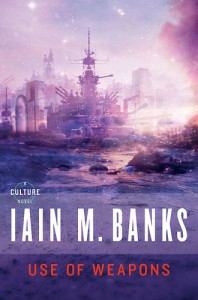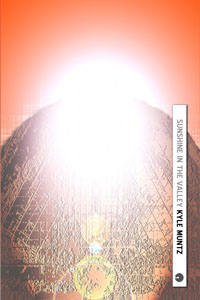Green Lights by Kyle Muntz
 Green Lights
Green Lights
by Kyle Muntz
Civil Coping Mechanisms, May 2014
108 pages / $13.95 Buy from Amazon
In Kyle Muntz’s Green Lights, we’re exposed to wavelengths as beams of prose, an unnamed narrator whose world is flooded in the disparate hues of existence. There’s a meditative quality throughout, a detachment borne of Kafkaesque inquiry and a yearning for communication that teeters on the fiat lux’s of every day creation. Not just through visible light, but the invisible nanometers that escape normal sight. “I want to talk about color,” the book begins, and the colors of the spectrum quickly become a metaphor for revelation and metamorphosis. The characters, from the moon turned into a woman, to an old man embodying evil, become symbolic accoutrements for the journey which turns out to be an excursion to another dimension. Elements of the fantastic shine as in the “Blue” chapter when the whole neighborhood is covered in noirish film shades that masquerade as night, and then, “The world froze… Ice had taken over the world.” Winter isn’t just the congealing of the veins and muscles, but a coat of futility wrapped around his routine actions. “After much effort, I thawed my room. I’m not proud of the things I did to accomplish this,” he confesses, then further reveals, “I got a job carrying a flamethrower around the neighborhood, melting people. My coworkers treated me like shit.” The frost of survival is just as bleak as the cold treatment of his colleagues and the blending of colors weaves the conflagration of pain with the inferno of transformation.
There’s a melodic beat to Muntz’s writing, terse descriptions of events interspersed with sudden bursts of graphic visuals, often macabre in its evocations. It’s a delicate balance, but one he masterfully navigates, exploiting minimalism to maximize emotional defibrillations, injecting the grotesque to animate the mundane:
“One time when I was walking in the darkness, I stumbled over something, and it was him, sprawled on the ground, unable to move. He didn’t have eyes anymore. Maggots crawled amidst the remnants of his skin, fibrous muscles like totted spaghetti. Worms fucked his intestines. Beetles were chewing his brains.”
Like signal lights, there’s a revolving flow of ideas that are given free rein and then brought to a halting stop, warning yellows demarcating the blurry boundaries between illusion and reality. That border is often where Muntz’s narrator lingers, rarely surprised by the absurdity of the surreal events that happen around him, instead, levitating past the barriers. It’s almost as though the green light were always on and physics broken free of limitations to innovate. Muntz revels in experimentation, relishes the opportunities to change up the traditional narrative as he bakes x-rays of playful contemplations into the atlas of his construction:
“Sometimes when I looked into the distance, I remembered that the darkness I could see there was actually the mountain, holding up the base of the universe. If I were to walk that way, the neighborhood would never end, but eventually it would become less real… The road continued even where the world began to change colors.”
His main companion is his love interest, E, who is as curious as the narrator about the frontier, a geography that challenges the intellectual as much as the physical. Both are intertwined and both affect each other, a symbiotic terraforming that is volcanic in its effect.
“Nearby, behind an abandoned house, we found an immense flower growing from the ground. The flower was at least a hundred feet tall. Beads of water clung to its sides… She nodded. ‘It looks like a picture of itself, meaning it looks better than real. That means something. It implies amazingness.’
‘Should we climb it?’
‘Probably,’ she said. ‘If we didn’t, we would feel bad about it later.’”
There’s a lot of climbing in Green Lights and like E, we know we’d feel bad if we didn’t venture upward. Along the way, we get dashes of the videogame classic, Earthbound, embedded with David Lynch, Borges, and doses of Marquez. The combination acts as a variety of hues to assault our senses in this quirky and likable hike while at the same time, Muntz weaves his own identity through the narrative. I just wish there were more colors in the spectrum.
***
Peter Tieryas Liu is the author of Bald New World and Watering Heaven. He entropies at entropymag.org. He loves green lights. And red ones. And blue ones too.
July 21st, 2014 / 10:00 am
Green Lights
 Green Lights
Green Lights
by Kyle Muntz
Civil Coping Mechanisms, 2014
108 pages / $13.95 buy from Amazon
Rating: 8.5
To give the reader a dream on paper—that’s what sur-realist writing’s about, and Kyle Muntz’s new novella Green Lights (out 5/5/14 from Civil Coping Mechanisms) does it well. It sits nicely next to Jesse Ball’s Samedi the Deafness, Paul La Farge’s The Facts of Winter, and Shane Jones’ Light Boxes in my imaginary library of dream-novels. READ MORE >
May 13th, 2014 / 12:00 pm
In Theory, This Could Be Fun
Airport living from 5/14 thru 5/16 in celebration/mourning of the publication of my latest book, “The Fun We’ve Had.”
Any advice on keeping off of security’s radar? Anyone want a shout-out when I get really fucking bored? Anyone want to Skype while I’m leeching off the airport’s Wi-Fi?
Maybe I’ll just watch that Tom Hanks movie and do exactly what he did. Could be good.
Here’s the blog post I wrote about this, whatever this is:
In a big way, being in an airport is a lot like being lost at sea. So many places and possibilities to drift, but not if you don’t already know where it is that you’re going.
I don’t know where I’m going. That’s why I’m not going anywhere.
I’ll be living in an airport for 48hrs.
Beginning 10AM on Wednesday May 14th through Friday May 16th around 10AM: Going nowhere and probably getting into some shit. There’s a good chance I will no longer be human by the end of it. There’s a pretty damn good chance that I’ve never been human. Not to worry, I’ll be online and active during the entire thing.
Odds are you’ll hear from me, be it a tweet, a post on Facebook, or a photo/video on Instagram. I’ll be calling out to everyone while I’m stranded in a state of flux. I’ll also have one of my best writer friends around, Kyle Muntz, hanging around, surviving this ridiculousness with me.
Yes I’m serious. Look how serious I am:
Will it be fun? I hope so. If not, I’ll be at the airport bar.
\m/ \m/
Use of Weapons by Iain M. Banks
 Use of Weapons (Culture Series)
Use of Weapons (Culture Series)
by Iain M. Banks
Orbit; Reprint edition, July 2008
512 pages / $15.99 Buy from Amazon
The Culture series by Iain M. Banks just keeps on getting better and in Use of Weapons, the narrative takes on added complexity in a two-pronged narrative that intertwines the tale of a hunter, Zakalwe, who has left the Culture and a woman, Sma, who still works for them. I’d go so far as to say this is one of the most experimental works by Banks, or for that matter, any science fiction writer, particularly in light of the ending. Because of its added intricacy, I (PTL) invited Joseph Michael Owens (JMO) and Kyle Muntz (KM) to collaboratively review the book and share/debate/spur our thoughts in a “cultural” exchange.
Peter Tieryas Liu: What was your take on Zakalwe and Sma in the pantheon of Culture characters?
Joseph Michael Owens: To be honest, Cheradine Zakalwe and Diziet Sma are probably two of my very favorite Culture characters overall, and I’m currently reading the last book in the series. The chemistry between them is truly fantastic. It’s hard to explain without giving away major spoilers, but you’ve got a really fantastic setup where you can see there is a great detail of history between them and it’s 100% believable. You can feel that they know each other incredibly well and, in some situations, they’re really the only ones that can handle each other.
Banks is also good with layering characters’ roles, and you get the feeling that both Zakalwe and Sma have done and seen a lot that doesn’t necessarily have to do with their current occupations, which I love. I think it adds an extra human element to the characters, these two specifically, because we’re shown that they exist — and have existed — outside of this single narrative. And since they feel like people and thus read like people.
The ending is . . . it’s just wow. . . .
Kyle Muntz: I’m not sure I can add too much to Joe’s comments (since I think that’s totally on-base and right), but in retrospect, I’d say Diziet Sma in particular has really stuck with me. The Culture series has a lot of strong female characters, but Sma is definitely one of the most interesting and best realized. For me, one thing the experimental elements of the novel call attention to (by telling Zakalwe’s story forwards and backwards at the same time) is how broad life is; and how separate different episodes in it can be. Especially when the chronology is destabilized. The novel gives glimpses of the same people, years apart–and each time they seem different, sometimes almost unrecognizable. And that’s life.
Use of Weapons is the last Culture novel to focus on a small cast of characters. After this, it becomes a sequence of vaguely Pynchonian ensemble pieces, and while I love the broader scope that brings to the series, it makes me appreciate the more intimate characterizations of the earlier novels, especially this and Player of Games. Characterization wise I think Banks is in top form here. In general, every Culture novel is unique, but formally none of them stand apart as strongly as Use of Weapons.
PTL: One of the most interesting chapters is when Banks’ describes Zakalwe’s first time aboard a Culture ship, Size Isn’t Everything. It’s our first real exposure from the eyes of a newcomer to how different the Culture is from everything we know, particularly with a post-scarcity economy in which anyone can do what they want.
One of the dialogues I remember is a waiter who talks about what’s important in life and why he enjoys wiping tables when he can do anything he wants: “I could try composing wonderful musical works or day-longer entertainment epics, but what would that do? Give people pleasure? My wiping this table gives me pleasure. And people come to a clean table, which gives them pleasure. And anyways, people die; stars die; universes die. What is any achievement, however great it was, once time itself is dead?” What do you guys think about the Culture? Things you like and dislike?
JMO: I remember Banks saying once that he modeled the Culture off of his ideal utopia, which is kind of cool because that’s an example of the power of writing and creativity: you can literally create your own world, and then go play in it! There’s really nothing I dislike about the Culture; I’m like the ultimate Culture fanboy. The way I’ve read it since book 1 (Consider Phlebas) is that a pan-human race created AIs that were able to perpetuate and evolve themselves into the Minds we know and love in current Culture novels. The AIs basically take care of all the mundane activities for humans so that humans can dedicate themselves to whatever they want: art, recreation, education, various experiences in general. Disease has been eradicated in the biological citizens, and people can augment themselves any number of ways they desire for utility or for fun. This sounds totally like a place I’d want to live!
KM: There’s a certain amount of tension within the novels about the Culture, mostly questioning how such a powerful, secular, completely free, post-violence, post-scarcity society (controlled entirely by machines) should interact with violent, oppressive, warfaring societies who rule themselves and do a terrible job of it. But I think the Culture is objectively pretty perfect.
I read the series over a year ago now, but it was the setting that kept me coming back: the Culture, endless, unchanging, as a place to live and way of life to be explored. Genre fiction tends to treat society as something to be moved: societies fight war, are saved from corruption, whatever. Which I’ve always thought was boring, and pushes me away from series like Song of Ice and Fire. Instead, the Culture is basically incorruptible and one of the most intellectually sound utopias in fiction. (Another good example is Triton by Samuel Delany.) There are elements of the setting I still think about pretty regularly, and in retrospect even echo through a novel I wrote called The Holy Ghost, which was about a utopian-ish society that did have to deal with scarcity.
Another main tension is always going to be that the Culture isn’t run by people — it’s run by machines infinitely smarter and, yes, more humane than we’ve ever been. This isn’t something I’d want to dive too deeply into, other than to say: I don’t really see the problem.
PTL: The contrast between the Federation (e.g.) in Star Trek and the Culture is fascinating in that while both are postscarity, the latter embraces human nature to an extreme while the Federation espouses a future in which human nature is transcended. Sma is casual about her sexual liaisons with crew members and all hints of traditional morality are banished, whereas in the Federation, conservative values are still very prevalent. But the biggest difference is that the Minds run the Culture whereas the Federation has a council that is susceptible to corruption. So in that sense, the Culture could not exist if it weren’t for the Minds and Artificial Brains that are in control. Beychae, the target of Zakalwe’s chase, poses an interesting thought: “The Culture believes profoundly in machine sentience, so it thinks everyone ought to, but I think it also believes every civilization should be run by its machines.” Zakalwe replies: “I have no idea whether they’re the good guys or not… They certainly seem to be, but then who knows that seeming is being? I have never seen them be cruel, even when they might have claimed they have an excuse to do so. It can make them seem cold, sometimes. But there are folks that’ll tell you it’s the bad gods that always have the most beautiful faces and the softest voices.”
In some ways, these “Artificial” Minds are the future gods, albeit quirky and eclectic ones. Do you think there’s an assumption by Banks that humans can’t achieve this totally peaceful society by their own means and need someone else in control? For all practical matters, if there were a master species of aliens that were also benevolent, they could easily take the place of the Minds in the fiction (though that probably would have been harder to swallow for human readers who would equate it to human slavery).
JMO: I like the Minds-as-future-gods idea because to us, they would be, especially given that they (i.e. the Culture) are a level 8 civilization. However, there are also level 9 and 10 civs out there (10 being those civs that have Sublimed, if I recall), who are ostensibly gods even to the Culture and other level 7-8 civs. This is something you are even given an example of in the final Culture novel, The Hydrogen Sonata, when one Mind talks to another that has actually returned to “the Real” from the Sublime (something that is almost unheard of).
Also, I got this from a wiki: “Also significant within the Culture novel cycle is that the book shows a number of Minds acting in a decidedly non-benevolent way, somewhat qualifying the godlike non-corruptibility and benevolence they are ascribed in other Culture novels. Banks himself has described the actions of some of the Minds in the novel as akin to “barbarian kings presented with the promise of gold in the hills”.”
I think the idea is that, once Sublimed, you are fully actualized within the greater universe. One of the feelings you get, however, is that Subliming is something civilizations also do when they — for lack of a better term — get bored, and decide simply to “retire.”
To go with your main question, I think as long as there is a sense of “us” and “them,” or more specifically, “the other” — and as long as there are resources that are not available to everyone — it will be incredibly hard for humans to achieve such a totally peaceful society by their own means. Humans are inherently opportunistic, even when they have the best intentions. As long as someone else has something you want, you’ll likely experience some level of envy. Oftentimes the sense of envy will be manageable, but what happens when it’s not, i.e. in situations where what you want involves feeding starving people? Of course that’s a base need versus simple want, but when resources become scarce, the line gets blurry.
December 30th, 2013 / 11:00 am
Rays of Creation: Sunshine in the Valley by Kyle Muntz
 Sunshine in the Valley
Sunshine in the Valley
by Kyle Muntz
Civil Coping Mechanisms, 2010
222 pages / $14 Buy from Amazon
Through its ecstatic sweep and baroque grandeur, Sunshine in the Valley by Kyle Muntz espouses rays of creation that both illuminate and transfigure the atmosphere. It has an ethereal quality of infinite expansion, with a poetic opulence relating to a kind of freedom without a hint of anxiety or any inhibition. The feeling is like embracing the sky in fullest light – a celestial glow imparting splendor bathed in Uranian auras of mystery and rapture. Gazing through this diamond prism is a true delight.
September 5th, 2011 / 12:00 pm

